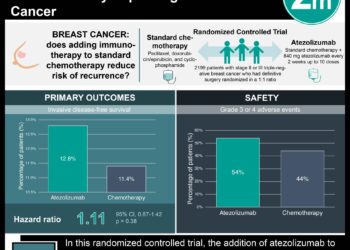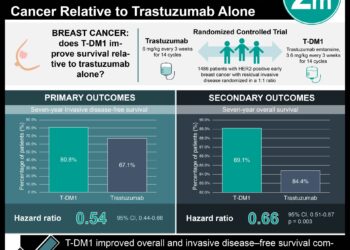Quick Take: Breast cancer risk in transgender people receiving hormone treatment
Breast cancer is the most common cancer seen in females, though it is rare in males. Transgender individuals experience incongruence between the sex assigned to them at birth and their experienced or expressed gender. Within this patient population, there has been an increase in the number of referrals for endocrine treatment, where patients can receive gender-affirming hormones, inducing desired physical changes (i.e. body hair, body composition). In trans women who are assigned male sex at birth but identify as female, this typically consists of anti-androgens and estrogens. In trans men, treatment usually consists of testosterone. In addition, while it has been established that sex steroids induce changes in breast tissue, it is not clear whether the receipt of exogenous sex steroids influences breast cancer risk in the transgender population. In this retrospective, nationwide, cohort study, 2260 adult trans women and 1229 adult trans men who received gender-affirming hormone treatment were followed-up to investigate the incidence and characteristics of breast cancer in transgender people in the Netherlands as compared to the general Dutch population. Researchers found that over the course of 33,991 person-years, there were 15 cases of invasive breast cancer in the trans women group. The median duration of hormone treatment in these patients was 18 years (range 7 to 37 years). When compared to cisgender men in the general population, this was 46-fold higher (RR 46.7, 95% CI 27.2 to 75.4), but lower than that observed in cisgender women (RR 0.3, 95% CI 0.2 to 0.4). Of these tumors, most were of ductal origin, estrogen and progesterone receptor positive, and 8.3% were HER2 positive. In the trans men subgroup, 4 cases of invasive breast cancer were identified, with a significantly decreased risk when compared to cisgender women (RR 0.2, 95% CI 0.1 to 0.5). The median duration of hormone treatment in these patients was 15 years (range 2 to 17 years). This study therefore shows that trans women receiving gender-affirming hormone treatment have an increased risk of breast cancer compared to cisgender men. This has important implications for breast cancer screening in trans women.
Click to read the study in BMJ
Image: PD
©2019 2 Minute Medicine, Inc. All rights reserved. No works may be reproduced without expressed written consent from 2 Minute Medicine, Inc. Inquire about licensing here. No article should be construed as medical advice and is not intended as such by the authors or by 2 Minute Medicine, Inc.







